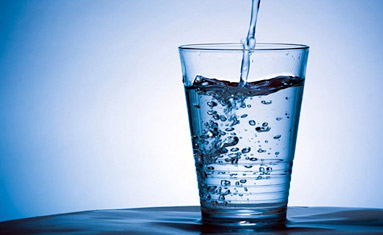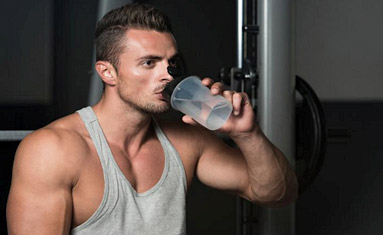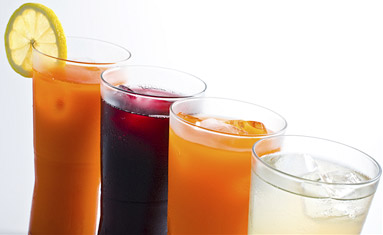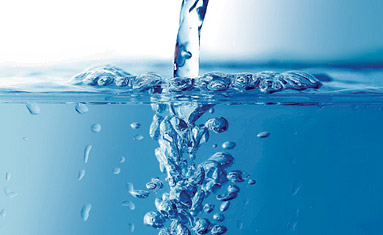BODYBUILDING & WATER INTAKE: HOW MUCH DO YOU NEED PER DAY?

Proper water intake.
It may not be the most exciting subject in the world, but it’s a habit that will pay dividends both for your fitness program and your overall health in general.
If you really want to build muscle, burn fat, gain strength, as well as maximize your gym performance and health, drinking enough water each day is something that should not be over-looked.
In this post I’ll be discussing the importance of proper water intake and will outline how much water you should drink per day for optimal benefits.
Let’s jump into it…
What Makes Water Intake So Important?

Given that the human body is comprised of roughly 60% water (with the brain and muscles being made up of 70-80% water) and that every single system in your body needs it to function, it would require a literal essay to cover all of the benefits that adequate water consumption provides.
When it comes to overall health, here are just a few of many examples…
- Aids in digestion.
- Detoxifies the body.
- Regulates temperature.
- Shuttles nutrients into cells.
- Assists with proper brain function.
- Keeps the kidneys working properly.
- Improves mood and concentration.
It isn’t just about overall health though…
There is also a direct connection between water intake and bodybuilding, and drinking enough each day will provide several benefits both in and out of the gym.
Not only will fully hydrating your muscle cells cause your physique to appear fuller and more defined in general, but it will also keep your strength and power output operating at its maximum potential.
Research has shown that being even slightly dehydrated can decrease strength and physical performance significantly.
Always entering the gym in a fully hydrated state is one of the simplest things you can do to ensure that you’re always training at your best.
Since water intake also appears to have direct effects on mood and concentration, this may also have some carry over to the quality of your training sessions as well.
Water also plays a role in reducing the risk of injury by lubricating the joints and forming a protective “cushion” around them.
Heavy weight training over time can undoubtedly subject your joints and connective tissues to quite a bit of wear and tear, and proper water intake can help to alleviate some of that stress.
On top of all of this, consuming adequate water each day can also help to reduce unwanted subcutaneous water retention, which will give your body a slightly harder and “drier” appearance.
When water intake is restricted, the body reacts by retaining more fluid as a natural defence mechanism. A consistent intake of water throughout the day will have a natural “flushing” effect since the body will have no incentive to hold on to that additional fluid given the constant external supply it is receiving.
As you can see, bodybuilding and water intake are closely linked, and it’s definitely something you’ll want to pay attention to for all of the reasons listed above.
How Much Water Should You Drink Per Day?

So, how much water should you actually drink each day for health and bodybuilding purposes?
Although many people will try to give one set guideline for everyone to follow, the problem with this is that proper water intake can vary hugely from person to person depending on a variety of factors.
Aside from differences in total body weight, the amount that an individual sweats throughout the day also plays a very important role.
The more you sweat, the more water you’ll need to drink to replace your losses, and this can add up to a very significant amount over the course of a day for some people.
The amount that you sweat will be influenced by a several things, including:
- How often you workout.
- The duration/intensity of your training sessions.
- How much you move around throughout a given day.
- The type of climate that you live in.
All of these factors will play a significant role in affecting your levels of hydration.
A person who lives in a hot climate and trains 6 days per week is almost certainly going to require far more water than someone who trains 3 days per week and works a deskjob in a cooler climate, even if those two individuals weigh the same.
You’ll hear many different recommendations when it comes to how much water you should drink per day, ranging from “8 glasses” to “half an ounce per pound of body weight” to “1 gallon”…
While all of these guidelines will usually put the average person somewhere around the right level, it makes far more sense to simply adjust your water intake to your own individual needs.
How?
You can gauge this pretty effectively by simply looking at the color and smell of your urine throughout the day. If it’s reasonably clear and odorless, this is a pretty good indication that your body is adequately hydrated.
If that requires 2.5 liters, 4 liters or 6 liters daily for you to reach that point, then that’s totally fine. Again, it will vary quite a bit depending on your circumstances.
Once you’ve made the conscious decision to drink more water and have experimented with it for a bit, you’ll pretty quickly find out for yourself specifically how much water you personally require in order to remain hydrated.
I’d recommend starting your day off on the right foot by getting in around half a liter of water fairly soon after waking, and then keeping your intake relatively steady throughout the rest of the day.
Taking a water bottle with you can also be a big help, as it will serve as a good reminder and keep you accountable if you’re continually forgetting to drink. It will also give you a concrete visual of exactly how much water you’ve been taking in at different points in the day.
What Types Of Water Should You Drink?

Any type of liquid that you consume will ultimately count towards your daily water intake, whether it be pure water, milk, juice, zero calorie drinks, coffee, tea or anything else.
Contrary to popular belief, caffeine is actually not that powerful of a diuretic, and caffeinated beverages still have a net positive effect on your hydration status.
The only exception here would be drinks that are high in alcohol content, as those will have a dehydrating effect when consumed.
As a side note, you’ll also take in a decent amount of water just through your regular food intake alone, with most people deriving around 20% of their daily water intake just from eating.
One word of caution I would give though is that it’s generally not a good idea to be consuming large amounts of calorie-containing beverages as a way of meeting your daily water needs, even if those drinks seem “healthy”.
The calorie content of things like juice, sugary smoothies or sports drinks will add up very quickly if you aren’t careful, since they’re very easy to consume and don’t satisfy hunger in the way that solid foods do.
Just a few glasses of these types of drinks can easily represent several hundred calories or more and can shoot your daily totals to an excessively high level without you even realizing it.
A controlled amount of these drinks is totally fine as long as you take the calories into account, but the majority of your intake should be in the form of regular plain water and other zero-calorie options.
The Bottom Line On Bodybuilding And Water Intake

Proper daily water intake is pretty straightforward, though a hugely valuable habit to develop.
It plays an endless number of different roles in optimizing overall health, and will directly benefit your bodybuilding and fitness program in a multitude of ways.
The main take away here is to just make sure that you have access to water at most points during the day, and that you’re drinking enough to the point where your urine is reasonably clear and odorless.
Concrete daily guidelines can be useful as a starting point, but water requirements ultimately just come down to the individual and can vary quite a bit from person to person.
Once you make a conscious effort to monitor your water intake throughout the day, you’ll pretty quickly get a feel for how much you need in order to stay hydrated.
If you found this article helpful, make sure to sign up for your FREE custom fitness plan below...




